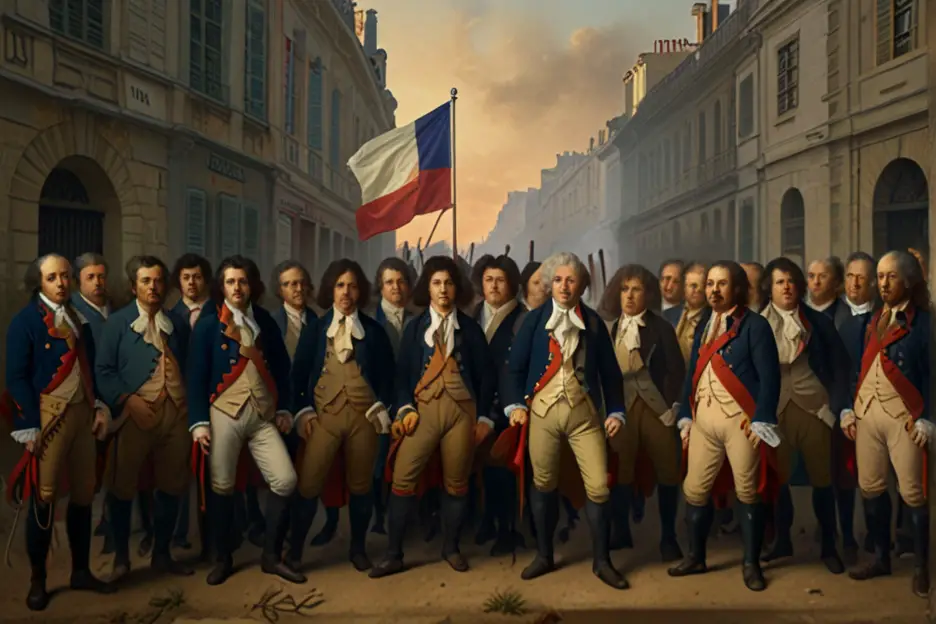
The Girondins were a faction of revolutionaries who emerged during the early stages of the French Revolution.
They were named after the Gironde region in southwestern France, where many of their supporters came from.
The Girondins were known for their moderate and liberal views, which set them apart from the more radical Jacobins who were also active during this period.
Who were the Girondins?
The Girondins were a diverse group of individuals from the Gironde region and beyond, united by their commitment to the principles of the French Revolution, such as liberty and equality.
They passionately advocated for social and political reforms, aiming to create a fairer society.
Despite their fervor and eloquence, they faced internal conflicts and were eventually marginalized.
Their legacy highlights the complexities of revolutionary movements and the enduring quest for justice.
- Read also: Liberty vs Equality: The French Revolution vs American Revolution
- Read also: The Rise and Fall of the Jacobins in the French Revolution
Their Role in the Early Revolution

In the early stages of the French Revolution, the Girondins played a vital role in shaping its direction.
They were instrumental in establishing the National Assembly in 1789, aiming to address France’s pressing financial and social issues.
Additionally, the Girondins significantly contributed to drafting the Declaration of the Rights of Man and of the Citizen, a cornerstone document embodying principles of liberty and equality.
Despite their initial influence, they faced internal conflicts and political challenges as the Revolution progressed.
Nonetheless, their commitment to revolutionary ideals left a lasting impact on the course of French history.
Power and Conflict
As the French Revolution progressed, tensions heightened between two prominent factions: the Girondins and the Jacobins.
The Girondins, advocating for moderate reforms, clashed with the more radical Jacobins, led by figures like Maximilien Robespierre and Louis Antoine de Saint-Just, known for their uncompromising tactics, including violence.
This conflict was not just political but also ideological, reflecting differing visions for the Revolution.
The Girondins were seen as proponents of gradual change within the bounds of revolutionary principles, while the Jacobins pursued more extreme agendas.
This rivalry marked a pivotal period of upheaval and debate, shaping the Revolution’s trajectory and leaving a lasting impact on French history.
The Mounting Crisis
In the summer of 1793, tensions between the Girondins and the Jacobins during the French Revolution came to a head.
Accusations flew between the factions, with the Jacobins branding the Girondins as traitors while the Girondins accused the Jacobins of violence and tyranny.
The crisis peaked with a successful Jacobin coup on July 2, leading to the arrest, imprisonment, and eventual execution of many Girondin leaders.
Behind the political turmoil were individuals with deeply held beliefs and fears, caught in the maelstrom of revolutionary upheaval.
This pivotal moment serves as a stark reminder of the human toll of ideological conflict and the fragility of freedom in tumultuous times.

The Girondins’ Downfall
The Girondins’ downfall marked a significant shift in the French Revolution, signaling the transition from a moderate to a more radical phase.
This event not only reshaped the course of the Revolution but also dealt a blow to the already weakened French monarchy, ultimately leading to its abolition in 1792.
Behind the political upheaval were individuals whose lives were deeply affected by the events, highlighting the personal toll of revolutionary change.
The Girondins’ downfall remains a poignant reminder of the complexities and consequences inherent in revolutionary movements, underscoring the ongoing quest for liberty and equality amidst tumultuous times.
Legacy and Aftermath
The legacy of the Girondins is complex, reflecting their dual role in the French Revolution.
Initially, they championed principles of liberty and equality, contributing to the Revolution’s early ideals.
However, their downfall marked a shift towards radicalism and violence, shaping the Revolution’s darker phases.
Behind these historical events are individuals whose lives were deeply intertwined with the Revolution’s tumult.
The Girondins’ legacy serves as a reminder of the intricacies of revolutionary change and the ongoing pursuit of justice and progress.
- Read also: Enlightening the World: The Lasting Impact of the Age of Enlightenment
- Read also: The Age of Enlightenment vs. the Scientific Revolution: A Tale of Two Revolutions
Conclusion
The rise and fall of the Girondins was a significant event in the history of the French Revolution.
They played a crucial role in the early stages of the revolution and helped to establish the principles of liberty, equality, and fraternity.
However, their downfall marked the beginning of a more radical and violent phase of the revolution that would have far-reaching consequences for the French people and the world at large.


